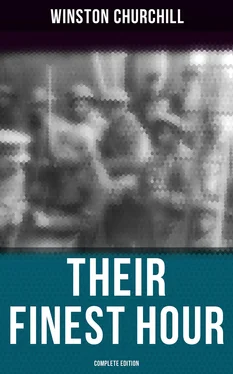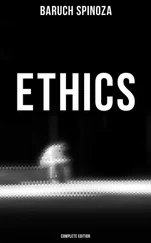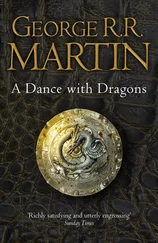The position of the First Lord of the Admiralty and of the Secretaries of State for War and Air was decisively affected in fact though not in form. They were not members of the War Cabinet, nor did they attend the meetings of the Chiefs of Staff Committee. They remained entirely responsible for their departments, but rapidly and almost imperceptibly ceased to be responsible for the formulation of strategic plans and the day-to-day conduct of operations. These were settled by the Chiefs of Staff Committee acting directly under the Minister of Defence and Prime Minister, and thus with the authority of the War Cabinet. The three Service Ministers, very able and trusted friends of mine whom I had picked for these duties, stood on no ceremony. They organised and administered the ever-growing forces, and helped all they could in the easy, practical English fashion. They had the fullest information by virtue of their membership of the Defence Committee, and constant access to me. Their professional subordinates, the Chiefs of Staff, discussed everything with them and treated them with the utmost respect. But there was an integral direction of the war to which they loyally submitted. There never was an occasion when their powers were abrogated or challenged, and anyone in this circle could always speak his mind; but the actual war direction soon settled into a very few hands, and what had seemed so difficult before became much more simple—apart of course from Hitler. In spite of the turbulence of events and the many disasters we had to endure the machinery worked almost automatically, and one lived in a stream of coherent thought capable of being translated with great rapidity into executive action.
***
Although the awful battle was now going on across the Channel, and the reader is no doubt impatient to get there, it may be well at this point to describe the system and machinery for conducting military and other affairs which I set on foot and practised from my earliest days of power. I am a strong believer in transacting official business by the Written Word. No doubt, surveyed in the after-time, much that is set down from hour to hour under the impact of events may be lacking in proportion or may not come true. I am willing to take my chance of that. It is always better, except in the hierarchy of military discipline, to express opinions and wishes rather than to give orders. Still, written directives coming personally from the lawfully-constituted Head of the Government and Minister specially charged with defence counted to such an extent that, though not expressed as orders, they very often found their fruition in action.
To make sure that my name was not used loosely, I issued during the crisis of July the following minute:Prime Minister to General Ismay, C.I.G.S., and Sir Edward Bridges 19.VII.40 Let it be very clearly understood that all directions emanating from me are made in writing, or should be immediately afterwards confirmed in writing, and that I do not accept any responsibility for matters relating to national defence on which I am alleged to have given decisions unless they are recorded in writing.
***
When I woke about 8 a.m. I read all the telegrams, and from my bed dictated a continuous flow of minutes and directives to the departments and to the Chiefs of Staff Committee. These were typed in relays as they were done, and handed at once to General Ismay, Deputy-Secretary (Military) to the War Cabinet, and my representative on the Chiefs of Staff Committee, who came to see me early each morning. Thus he usually had a good deal in writing to bring before the Chiefs of Staff Committee when they met at ten-thirty. They gave all consideration to my views at the same time as they discussed the general situation. Thus between three and five o’clock in the afternoon, unless there were some difficulties between us requiring further consultation, there was ready a whole series of orders and telegrams sent by me or by the Chiefs of Staff and agreed between us, usually giving all the decisions immediately required.
In total war it is quite impossible to draw any precise line between military and non-military problems. That no such friction occurred between the military staff and the War Cabinet staff was due primarily to the personality of Sir Edward Bridges, Secretary to the War Cabinet. Not only was this son of a former Poet Laureate an extremely competent and tireless worker, but he was also a man of exceptional force, ability, and personal charm, without a trace of jealousy in his nature. All that mattered to him was that the War Cabinet Secretariat as a whole should serve the Prime Minister and War Cabinet to the very best of their ability. No thought of his own personal position ever entered his mind, and never a cross word passed between the civil and military officers of the Secretariat.
In larger questions, or if there were any differences of view, I called a meeting of the War Cabinet Defence Committee, which at the outset comprised Mr. Chamberlain, Mr. Attlee, and the three Service Ministers, with the Chiefs of Staff in attendance. These formal meetings got fewer after 1941. 6 As the machine began to work more smoothly I came to the conclusion that the daily meetings of the War Cabinet with the Chiefs of Staff present were no longer necessary. I therefore eventually instituted what came to be known among ourselves as the “Monday Cabinet Parade”. Every Monday there was a considerable gathering—all the War Cabinet, the Service Ministers, and the Minister of Home Security, the Chancellor of the Exchequer, the Secretaries of State for the Dominions and for India, the Minister of Information, the Chiefs of Staff, and the official head of the Foreign Office. At these meetings each Chief of Staff in turn unfolded his account of all that had happened during the previous seven days; and the Foreign Secretary followed them with his story of any important developments in foreign affairs. On other days of the week the War Cabinet sat alone, and all important matters requiring decision were brought before them. Other Ministers primarily concerned with the subjects to be discussed attended for their own particular problems. The members of the War Cabinet had the fullest circulation of all papers affecting the war, and saw all important telegrams sent by me. As confidence grew the War Cabinet intervened less actively in operational matters, though they watched them with close attention and full knowledge. They took almost the whole weight of home and party affairs off my shoulders, thus setting me free to concentrate upon the main theme. With regard to all future operations of importance I always consulted them in good time;but, while they gave careful consideration to the issues involved, they frequently asked not to be informed of dates and details, and indeed on several occasions stopped me when I was about to unfold these to them.
I had never intended to embody the office of Minister of Defence in a department. This would have required legislation, and all the delicate adjustments I have described, most of which settled themselves by personal goodwill, would have had to be thrashed out in a process of ill-timed constitution-making. There was however in existence and activity under the personal direction of the Prime Minister the Military Wing of the War Cabinet Secretariat, which had in pre-war days been the Secretariat of the Committee of Imperial Defence. At the head of this stood General Ismay, with Colonel Hollis and Colonel Jacob as his two principals, and a group of specially-selected younger officers drawn from all three Services. This Secretariat became the staff of the office of the Minister of Defence. My debt to its members is immeasurable. General Ismay, Colonel Hollis, and Colonel Jacob rose steadily in rank and repute as the war proceeded, and none of them was changed. Displacements in a sphere so intimate and so concerned with secret matters are detrimental to continuous and efficient dispatch of business.
Читать дальше











